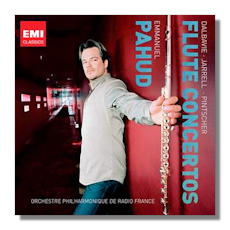
The Internet's Premier Classical Music Source
Related Links
- Latest Reviews
- More Reviews
-
By Composer
-
Collections
DVD & Blu-ray
Books
Concert Reviews
Articles/Interviews
Software
Audio
Search Amazon
Recommended Links
Site News
 CD Review
CD Review
Flute Concertos

- Marc-André Dalbavie: Concerto pour flûte
- Michael Jarrell: … un temps de silence …
- Matthias Pintscher: Transir
Emmanuel Pahud, flute
Orchestre Philharmonique de Radio France/Peter Eötvös
Orchestre Philharmonique de Radio France/Pascal Rophé
Orchestre Philharmonique de Radio France/Matthias Pintscher
EMI Classics 501226-2 DDD 54:59
Prominent musicians have a responsibility, one might argue, to commission new works, and not just because to do so keeps bread on composers' tables. Emmanuel Pahud, principal flute of the Berlin Philharmonic, and one of the most successful solo flutists on today's scene, has been doing his duty. Some of the results can be heard on this CD. Pahud commissioned all three of these concertos for the Berlin Philharmonic and the Zürich Tonhalle Orchestra (Dalbavie), the Orchestre de la Suisse Romande (Jarrell), and the Lucerne Festival (Pintscher).
The flute is no less amenable than any other woodwind instrument to compositions in a modern style. Still, when a CD such as this one is released, there's always a contingent of flute fans that beats their breasts or shakes their fists at the sky, asking why Monsieur Whoever can't stick to playing Bach and Telemann and Mozart. There's nothing wrong with those composers, of course, but recording their works over and over again doesn't serve any useful purpose, and most arrangements are valuable only for the immediate enjoyment that they give. They hardly advance the instrument, however.
So that's my apology, if one is needed, for these three concertos. Will they become permanent fixtures in the flute repertory? It's too soon to tell, but I am guessing they don't have much of a future except for that which Pahud might provide for them, in concert or on this CD. That doesn't mean that they are meritless works, however. It simply is a reflection on how the world of classical music probably is no less affected by the Law of Diminishing Returns than any other world.
All three concertos are in a single movement. Dalbavie's is the most fantastical in mood. For the most part, it is a 17-minute exploration of fascinating, transparent sounds. It is not unlike a musical light show. Jarrell's …un temps de silence…, as its name suggests, plays with negative space as well as with sound, and the relationship with the orchestra is more combative than collaborative. Pintscher's Transir – the name is an allusion to transition and journeys – was written in memory of composer Dominique Troncin, who died at age 33. Transir is based on Troncin's sketches, and has a decidedly valedictory air, although it is by no means morbid.
Pahud is very impressive in these works, although "in relation to who or what?" is a logical question to ask. Suffice it to say that I don't expect these recordings to be surpassed. The Orchestre Philharmonique de Radio France also does its share. For those who care about the flute and who don't want to see its repertory stagnate, this is a recommendable disc, although my recommendation is more dutiful than affectionate.
Copyright © 2008, Raymond Tuttle




















